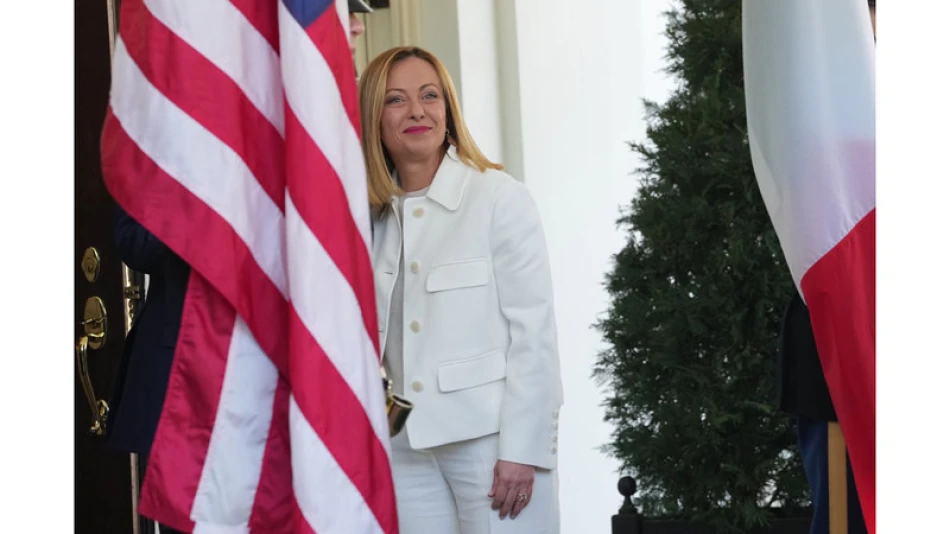
Georgia Meloni: The Iron Lady of the Trump Era Rises to Power
Europe's New Iron Lady: How Giorgia Meloni Emerges as Trump's Key Conservative Partner
As Donald Trump begins his second presidency and seeks to rebuild America's global influence, a familiar dynamic is taking shape across the Atlantic. Italian Prime Minister Giorgia Meloni is positioning herself as Europe's answer to Margaret Thatcher—a conservative powerhouse capable of matching Trump's vision and determination. Her rise from political outsider to Europe's most influential leader mirrors Thatcher's trajectory and suggests a new Reagan-Thatcher-style partnership could define Western politics in the 2020s.
The Making of a Conservative Alliance
The Reagan-Thatcher partnership of the 1980s wasn't just about shared ideology—it was built on mutual intellectual respect, constant communication, and a willingness to challenge each other toward bolder action. Both leaders emerged from outside their respective political establishments, championing free enterprise and national renewal while facing down the Soviet threat.
Today's geopolitical landscape presents different but equally complex challenges. Where the Cold War offered a clear existential threat, modern Europe grapples with fragmented challenges: mass migration, energy instability, technological disruption, and an increasingly multipolar world order.
Meloni's Unique Position
Meloni's ascent parallels Thatcher's remarkable journey. Initially dismissed as a far-right extremist, she transformed her Brothers of Italy party from a marginal movement into Italy's dominant political force. More significantly, she has achieved what seemed impossible in Italian politics: stable governance in a country notorious for political chaos.
Her coalition maintains strong approval ratings despite pursuing controversial reforms, and she has fundamentally shifted European discourse on migration, security, and sovereignty. Brussels has quietly adopted many of her policy positions, while other European leaders follow her lead.
The Trump Connection: More Than Symbolism
Meloni's invitation as the only EU head of government to attend Trump's 2025 inauguration wasn't merely ceremonial—it signals her emerging role as conservatism's standard-bearer in Europe. This relationship offers Trump something he lacked in his first term: a European partner who can match his political instincts while maintaining credibility with traditional allies.
Unlike other European leaders who either opposed Trump or offered lukewarm support, Meloni has built genuine trust with his inner circle. She represents a bridge between Trump's increasingly nationalist America and a European establishment that remains skeptical of populist movements.
Diplomatic Balancing Act
Meloni's diplomatic skills shine in her ability to maintain Italy's NATO commitments and support for Ukraine while simultaneously building relationships with Trump's circle and other populist politicians. This balancing act positions her as an indispensable mediator between an America growing more nationalist and a Europe struggling with internal divisions.
Limitations and Realities
The comparison to the Reagan-Thatcher era has clear limits. Italy, despite its G7 status and Mediterranean influence, lacks Britain's nuclear capabilities and historical "special relationship" with Washington. Thatcher's Britain was a global financial center and military power; Meloni's Italy, while economically significant, operates with different constraints.
Moreover, today's fragmented European political landscape differs dramatically from the bipolar world of the 1980s. The Soviet threat unified Western responses; current challenges—from Chinese economic influence to Middle Eastern instability—require more nuanced, multilateral approaches.
Market and Strategic Implications
For investors and policymakers, Meloni's rise represents several key trends. Her success demonstrates that conservative populist movements can govern effectively when led by pragmatic politicians willing to moderate their positions. This has implications for markets nervous about political instability in major European economies.
Her influence on EU migration policy already shows how individual member states can drive continental policy changes. This suggests a more flexible, nation-state-driven European Union—potentially more appealing to American policymakers who prefer bilateral relationships over dealing with Brussels bureaucracy.
The Path Forward
Meloni's combination of ideological conviction, charismatic leadership, and strategic thinking positions her uniquely for the Trump era. Like Thatcher, she demonstrates willingness to challenge conventions and take risks, even when controversial. Her ability to maintain domestic stability while projecting international influence offers Trump the kind of reliable partner he needs to advance conservative priorities globally.
The Reagan-Thatcher-John Paul II alliance reshaped the late 20th century by combining American power, British resolve, and moral authority. Whether a Trump-Meloni partnership can achieve similar historical significance depends largely on their ability to address 21st-century challenges with the same clarity of purpose their predecessors brought to confronting Soviet communism.
As Europe's political center continues fragmenting and traditional alliances face new pressures, Meloni has already proven her readiness for the global stage. Her success in transforming Italian politics while building bridges across the Atlantic suggests she may indeed become the conservative leader Europe needs—and the partner Trump requires to advance Western interests in an increasingly complex world.
Most Viewed News

 Sara Khaled
Sara Khaled






